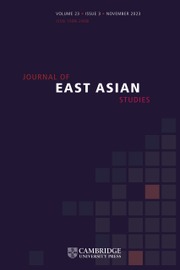We are delighted to announce that all articles accepted for publication in the Journal of East Asian Studies from the 3rd of October 2024 will be ‘open access’; published with a Creative Commons licence and freely available to read online (see the journal’s Open Access Options page for available licence options).
We have an OA option for every author: the costs of open access publication will be covered through agreements between the publisher and the author’s institution, payment of APCs for those with third-party funding, or else waived entirely, ensuring every author can publish and enjoy the benefits of OA.
Please see the journal's Open Access Options page for instructions on how to request an APC waiver.
See this FAQ for more information.




Highlight: Explaining Elections in Singapore: Dominant Party Resilience and Valence Politics
Fifteen Eighty Four | Cambridge University Press
What innovations changed the human world for ever?
What Kind of Healthcare Research Do We Really Need?